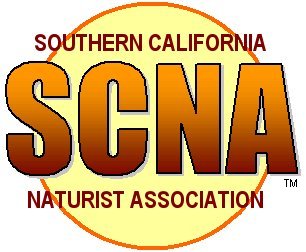
|
SCNA NUDIST FORUM
Return to Nudist Forum Menu |
Articles Reprinted with permission.
AANR has as part of its mission statement to "advocate nudity and nude recreation in appropriate settings," meaning places where it is legally sanctioned only. The Naturist Society has a broader definition that encompasses traditional clothing-optional beaches, hot springs, lakes, hiking trails, and anywhere else nobody objects.
Many AANR members see the Naturist Society's opinion as reckless as it endangers the existance of the 200+ landed clubs and parks secluded across the country. Those who take the broader view see it as a civil rights issue. The most recent debate started with an article in the monthly AANR Bulletin in June 2011, which was followed by a Letter to the Editor, which prompted another reply, etc. etc. We print here both points of view (edited for space.)
1. Government Affairs Report: What is Appropriate?
There has been a lot of discussion lately on the use of the word, "appropriate." It can be an adjective clarifying a noun, and add "-ly" and it becomes an adverb clarifying a verb. Add "-ness" and you have a noun, or place a "d" on the end and you have a verb. The dictionary defines the adjective as, "Suitable for or belonging to the person, circumstance, or place; fit; proper; relevant." A second definition, when used as a verb means; "To set apart for a particular use; to take for one's own use." (Congress appropriated the funds).
AANR uses the adjective "appropriate" to describe where it is proper or fit to practice nude recreation. It is a strong and versatile word; it is used by many different groups and can mean different things to different groups. For instance in dress, it would not be appropriate to wear a tux to a beach wedding or shorts and halter to a formal wedding. The same goes for nude recreation. We need to be dressed or undressed appropriately. Being nude in inappropriate locations is in poor taste and causes unnecessary problems with other users and local officials. Some have stated that the word is not forceful enough when used in connection with trying to expand or keep areas open for nude recreation, but the one thing most of us agree upon is that the more appropriate areas for nude use, the better for us all and the happier we will be.
AANR's philosophy of working within the system in appropriate ways and in appropriate locations has resulted in AANR being invited to work with different management groups across the country that can have a direct impact on improving and creating new areas for nude recreation. AANR/GAT are working toward keeping the existing appropriate nude locations and helping to create new locations whenever an opportunity presents itself. In order to reach our goals we look at the managing organizations, finding out how they make decisions and working within their decision-making process as much as possible. If their reasoning for a negative decision is unfounded, then we try to enlighten them to change their criteria that defines an acceptable nude recreation area.
Keeping in mind our philosophy of working within the system, we had a meeting with the top four people from California's Department of Parks and Recreation. The purpose of the meeting was to discuss nude recreation in California. We had contacted them requesting this meeting to discuss an offer that might help keep some areas open and help us by increasing or improving nude recreation in California.
The Naturist Society and the Naturist Action Committee have a different philosophy than AANR and its Government Affairs Team. Both groups are working toward the same goal, but using different paths towards improving and expanding the locations available for nude recreation in California. We at AANR see both paths as complimenting each other.
2. An “Appropriate” Response
I must respond to Dave Graber’s article in the June Bulletin about “appropriate nudist settings.”
It is important to remember that 80 years ago, Kurt Barthel and Ilsley Boone gave birth to the American nudist movement by not “working within the system” as Graber now advocates. If our founders had waited to officially receive an okay, Sky Farm would have never existed. ASA (AANR’s predecessor) owes its very existence to a handful of stubborn pioneers who refused to wait for the system to “approve” us. Boone and Baxandall established their parks and beaches, forcing officials to deal with a fait accompli.
If they were alive, I think our pioneers would be the first ones to endorse the San Francisco Bare to Breakers 10k race, where nudism is not only accepted but cheered by 100,000 spectators each May. Boone, Barthel, and certainly Alicia Keyes would be riding their bikes in the World Naked Bike Ride, an event now staged in 200 cities around the world with nary a peep of protest. There are dozens of other public parades and festivals held in this country from Seattle to Chicago to New York to Key Biscayne where nudity is allowed and publicly cheered. Sadly, AANR has never recognized them. In fact at a national meeting a few years ago, I personally heard the Executive Director and a past president oppose such events because they weren’t “appropriate.” There’s that word again.
What is now seen as “appropriate” at Haulover Beach, Sandy Hook, Black’s Beach and dozens like them across the country all had to be won, not negotiated. It took hundreds of nudists working outside the system who were brave enough to return to their beach again and again and stand up for their rights. If we had followed the “appropriate” path advocated by Graber and GAT, these successful nude beaches would not exist.
You also need to know that San Onofre in California is not closed to nude use, despite what is written in the Bulletin. In the tradition of our founders, well over a hundred nudists continue to show up on any given weekend day. Of the twelve tickets written since last summer, ten out of 12 were dismissed (the other two settled out of court). As a result, we hear the local superintendent may be reconsidering his anti-nudity efforts there. This is how beaches get won, and stay won.
This country has a long tradition of fighting what those in power deem “appropriate.” If Rosa Parks and Martin Luther King had only worked within the system and waited for permission, the Civil Rights movement would never have happened. Going back further, women would never have been granted the right to vote. And going back still further, we might still be British subjects! If you fear you might fail, then you already have!
Dear Editor:
Gary Mussell's "Appropriate Places" Letter to the Editor in the September Bulletin argues that AANR should work to gain more acceptance of nude recreation by supporting nude activities in places where nudity may be tolerated but is not legal. He cites examples of past accomplishments achieved by illegal actions. In doing so, he flirts with an "end justifies the means" philosophy that is not supportive of the democracy we strive to achieve in our society.
Mr. Mussell demonstrates a profound lack of understanding of the non-violent civil disobedience practiced by the Reverend Dr. Martin Luther King, Jr. and Ms. Rosa Parks when he equates the World Naked Bike Ride (WNBR) to their civil rights efforts. Those great leaders believed that a high degree of respect for the rule of law is an essential part of any democratic society.
They believed civil disobedience is justified and should be practiced only when a number of important circumstances exist. The circumstances include: the existence of a substantial injustice that is much greater than the injustice caused by their disobedience, the failure of every other means of working within the system to correct the injustice, and the protesters' willingness to endure the law's penalties for their disobedience. The WNBR and its participants are unlikely to meet any of those criteria.
Long-time Naturist Action Committee (NAC) Director Mark Storey has an excellent essay on
Naturism and Civil Disobedience that should be required reading for any naturist who is considering protests that involve illegal activities. Mr. Storey concludes:
"[W]e must use the legal means at our disposal before engaging in CD [Civil Disobedience]. There is much more that each of us can legally do . . . Perhaps before we consider engaging in what may very well be justified civil disobedience we should see what we can do legally to change society's attitude toward us."
That is exactly what AANR is doing: ". . see[ing] what we can do legally to change society's attitude toward us." Arguably some softening of AANR's appropriate places policy might be justified but, AANR's approach is clearly more responsible and beneficial to the nudist community and our broader society than the "nudity is OK because I can get away with it" activities, such as WNBR, that Mr. Mussell advocates.
Click here to read to read Mark Story's essay discussed above.
Some places where nudity is accepted but isn't technically legal
Mr Fred W. Van Nest's “Appropriate places” letter of the November Bulletin perpetrates several misunderstandings about The World Naked Bike Ride (WNBR) and civil disobedience in general. I would be among the first to acknowledge that the WNBR cause in no way rises to the level of the Civil Rights Movement of the 1960s and 70s. Nonetheless, there are a number of substantial parallels between the two movements.
While Mr. Van Nest is correct that Dr. Martin Luther King had a high degree of respect for the law, he gloss over King's distinction between just and unjust laws, as detailed in his Letter From Birmingham Jail. Dr. King describes an unjust law as a “a code that is out of harmony with the moral law”, and “any law that uplifts human personality is just. Any law that degrades human personality is unjust”.
Modern Nudism is fundamentally rooted in the notion that there is nothing shameful, or dirty or immoral with mere nudity, and that nudity brings us closer to nature and removes the distinctions of status and class that otherwise divide people. The nudist is therefore compelled to reject any law which describes nudity as indecent as unjust because it is out of harmony with nature and degrades human personality by defining the condition that every human being is born as obscene.
Dr. King goes on to describe an unjust law as “a code that a numerical or power majority group compels a minority group to obey but does not make binding on itself.” Any law in our male-dominated society which forbids women from appearing topless in public but allows men to do so is, by Dr. King's reasoning, unjust.
Dr. King explains he turned away from negotiation and resorted to acts of civil disobedience in part because black people could not get fair treatment in the courts. Here, events such as WNBR differ from the Civil Rights Movement in that naked protesters virtually always win their court cases and charges of indecency are dropped. Contemporary American courts are loath to interfere with naked freedom of expression as part of protest. Dr. King quotes St. Augustine that “an unjust law is no law at all”. I would add to that “a law in which the courts refuse to enforce is also no law at all”.
Finally, Dr. King submits “an individual who breaks a law that conscience tells him is unjust, and who willingly accepts the penalty of imprisonment in order to arouse the conscience of the community over its injustice, is in reality expressing the highest respect for law.” Participants of WNBR are sincere in their belief that nude protest help raise public consciousness of their messages of freedom from oil-dependency, the unjust nature of anti-nudity laws and the tyranny automobiles exhibit on public streets. They are instructed to obey direct orders from the police, take their citations without indecent and argue their subsequent cases in court. Far from being unsupportive of the democracy are society strives to achieve as Mr. Van Nest claims, in Dr. King's terms WNBRers are expressing their highest respect for the law.
In the same letter Dr. King expresses two disappointments: his first is with the white moderate, who in principal agrees discriminatory laws should be revised, but who is concerned with order over injustice, who argues that the time is not right for action, and that although the wheels of justice might be slow, they will eventually turn right. Likewise, I am disappointed by the “appropriate settings” advocates of nudism: Mr. Van Nest, in Dr. King's terms, is the white moderate of the nudist movement.
Why should anyone have to wait or negotiate for their rights? Why should I have to drive hundreds of miles to an 'appropriate' Nudist club that as likely as not won't allow me entrance as a guest let alone allow me to become a member because of their discriminatory policies on gender and marital status?
Dr. King regretfully concludes that because of their contentment with the status-quo and their inability to sympathize with a minority, the white moderate is actually more of an impediment to the Civil Rights Movement than the KKK or the White Citizen's Counsel. The same charge can be leveled at the 'appropriate settings' nudist. Content to sit in their private clubs, these naïve nudists proclaim nudism to be the great equalizer while facing the reality that their demographic is rapidly shrinking, becoming older and whiter. Many seem oblivious to the restrictive entrance policies of their own organizations, or the restrictions placed on guests. They possess most of the wealth of the nudist community, but are most content with the status quo, and rebuke other nudists for alternate strategies.
Dr. King also expresses deep disappointment with the leadership of white church: instead of recognizing the moral imperative of the civil rights movement and becoming its solid allies as he had expected, he bemoans that they instead became its bitterest enemies, misrepresented it and vilified its leaders; or perhaps worse, became “more cautious than courageous” and “remained silent behind the anesthetizing security of stained glass windows.”
Again, there are similarities between Dr. King's disappointment with the white church and my disappointment with AANR. AANR claims to be a voice for all nudists, but have in fact made “appropriate settings”—a option unavailable to many nudists—part of their official doctrine. Their leadership relaxes behind the anesthetizing security of the walls of their gated communities issuing contradictory statements on the one hand about the wholesome, family oriented nature of nudism, its heath and social benefits, but on the other hand that it needs to be restricted to private settings in order to protect the public.
AANR's actions concerning San Onofre beach speak for themselves: in their own statement, they decided to nurture their 'positive relationship' with the state of California and engage in talks instead of signing a petition to preserve the rights of all nudists in a place that has always been regarded as an 'appropriate setting' advanced by an organization 'associated with legal confrontation'. Mr. Van Nest urges us to exhaust our legal options before taking action, whereas AANR even shies away from legal confrontation! While AANR continues its now three year long talks, nudists are meanwhile being intimidated off San Onofre beach. Everyday nudists not associated with a club are not going to wait around while AANR conducts talks.
Finally, Mr. Van Nest urges nudists contemplating civil disobedience to consult Mark Story's essay on the topic. Mr. Story describes five conditions which should be met before an illegal act of civil disobedience is morally justifiable. All five conditions are easily met by WNBR.
The first condition is the need to show an actual injustice exists. WNBR is not just a collection of individuals lewdly flaunting their nakedness: it is a global protest movement with a clear message and act of political expression and is thereby, in the United States, protected speech under the 1st Amendment. The Supreme Court has consistently ruled that political expressions of speech even if deemed offensive to the public, such as gay pride, Nazi flags and cross burning, are protected speech. Police interference with the ride is therefore unjust.
The second condition is that good faith negotiations have failed. Mr. Story admits there are subtleties to this condition: for example, did Rosa Parks exhaust all negotiations before she refused to give up her seat? Dr. King may be exhausted all his attempts at negotiations in Birmingham, but does that mean all people everywhere sympathetic to civil rights had exhausted theirs? Clearly, the arguments for the non-obscenity of mere public nudity are not new. Many states have passed special exemptions to anti-obscenity laws for breast feeding, yet breast feeding women are still being ejected from public malls.
In 1992, the Court of Appeals of New York ruled non-commercial exposure of a female breast does not constitute obscenity, yet women in that state have been cited numerously since then merely for appearing topless in public. The Denver Colorado police threatened participants of the 2009 WNBR that they could be charged as sex offenders if they participated in the free-speech protected protest event. In the first Madison WNBR of 2010, in which I participated, before the ride began the city police fully admitted that there was no city ordinance against nudity, yet threatened us they would cite us for disorderly conduct if anyone complained. After complaints had allegedly been made, the police instructed us to cover our genitals. Subsequently, the atomically-challenged police issued citations to women for exposing their breasts . Clearly, the hysterical frenzied opponents of public nudity will twist the intent of existing laws, ignore court rulings and even resort to extra-legal means to muzzle naked free-speech. There is no room for negotiation is such an environment.
The third condition is that participants of civil disobedience are working to right an injustice and willing to suffer the penalty of the law. In 2010, the Chicago WNBR had an unusually large turnout considering the poor weather not because a large number of people spontaneously wanted to expose themselves in pubic, but because there was phenomenal outrage over the BP Deepwater Horizon incident in the Gulf of Mexico earlier that year. Turnouts were very good in other cities. That year saw the first successful ride in Madison. On that ride nine citations were made. The only incident on the scene was when a police officer placed a rider in his squad car and refused to give her clothes back. Otherwise, the event proceeded orderly. The riders who were cited worked within the legal system by hiring lawyers, attending numerous hearings and enduring seemingly endless continuances all the while maintaining that they had broken no law or city ordinance and where engaged in first amendment protected free speech. All charges that came to trial were dropped. It was a textbook case of civil disobedience.
Mr. Story's fourth condition is that participants of civil disobedience must acknowledge that other people or groups suffering from similar injustice have the right to conduct their own acts of civil disobedience. WNBR by its nature encourages any city of any country to participate. Although the title focuses on 'naked' and 'bide ride', in fact there is cross over with environmentalist and share-the-road advocates, and participants can engage in any form of people-powered transportation such as skate boards and roller blades. Participants are likely to encounter advocates of other protest groups, such as topfree protests. WNBR does not bill itself the credible voice in naked bike ride protest or any other such exclusionary nonsense, but instead invites everyone with a compatible message to participate.
The last condition that Mr. Story cites is that the civil disobedient act must promote some positive result. Obviously, acts of vandalism and violence are not likely to generate support from the general public. WNBR, in the US in particular, have forced many municipalities to confront the fact that their anti-obscenity laws are are vague, discriminatory, difficult to enforce, and generally unpopular. The ride gives the public a chance to see nudists not as lewd, pedophilic flashers, but as a diverse group of people of different ages, genders, physiques and ethnicities, proud of their bodies willing to literally put their skin on the line to to raise awareness of important causes.
Simply put, the crowds love us: many hundreds, if not thousands, line up to watch us go by. Everywhere we go, we see smiles, waves, thumbs up and horn honking. There are cameras on us everywhere. They hold out their hands so that we can clap them as we go by. Women in fancy dresses run out into the street to be photographed by us. Nudists concerned about the public's negative attitude on public nudity simply must witness one of these events and see for themselves. Setting up booths in malls and passing out fliers is all well and good, but its can't compare to the public seeing real nudists having the courage to do what we know lots of people want to do if they could and have a great time doing it. Nudism can't get better publicity.
What Mr. Van Nest must recognize is that permission, granted for the time being, for nudists to use a small portion of a remote beach with no amenities is not exactly a stellar victory for anyone. Working on small projects quietly behind the scenes so as not to rouse the public's attention is not a campaign to secure rights, but is instead a policy of appeasement. Prior to the civil rights era in the deep south, black people had their own neighborhoods, their own schools, their own churches, their own shops, their own clubs, their own restrooms, their own drinking fountains and their own appropriate places to conduct their business.
Some nudists think they should be happy with their own beaches. Just as some poor black people were content with their lot and didn't want to make trouble, so too some nudists are happy to be relegated to second class status hidden from the view of the general public. The secluded nude beach is a ghetto.
I have been an AANR member for years. I read the AANR Bulletin. I have been to AANR clubs. I have spoken to AANR members about AANR. I can only hope Mr. Van Nest can claim the same familiarity about WNBR. Unfortunately, his claim that WNBR is somehow inconsistent with our democratic society is reminiscent with charges leveled against Dr. King himself: that he was an anarchist, that he was a communist, that he was trying to destroy America and that the ends don't justify the means. If Mr. Van Nest has to resort to that kind of rhetoric, I am more convinced than ever that WNBR is on the right path.
Click here for printable PDF version
"APPROPRIATE PLACES" - THE NARROW VIEW
The Bulletin, June 1, 2011
By Dave Graber, AANR Government Affairs Chair
"APPROPRIATE PLACES" - THE WIDER VIEW
Printed in The Bulletin, September 1, 2011
By Gary Mussell, President, SCNA
3. Appropriate Places - A Response
The Bulletin, November 1,2011
By Fred W. Van Nest,
Secretary, American Nudist Research Library and AANR-East Director

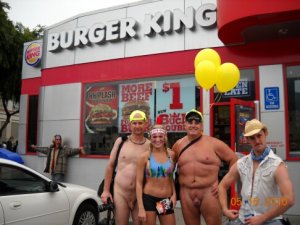
Shopping in San Francisco...Annual SF Bare to Breakers Run
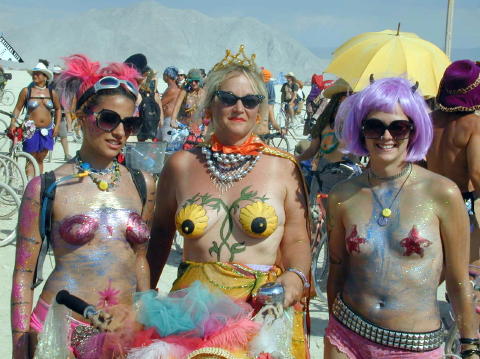
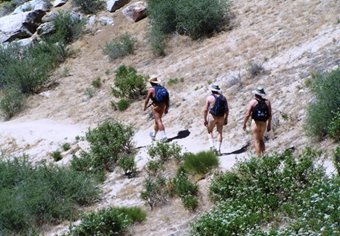
Burning Man, Nevada...Hiking in National Forests
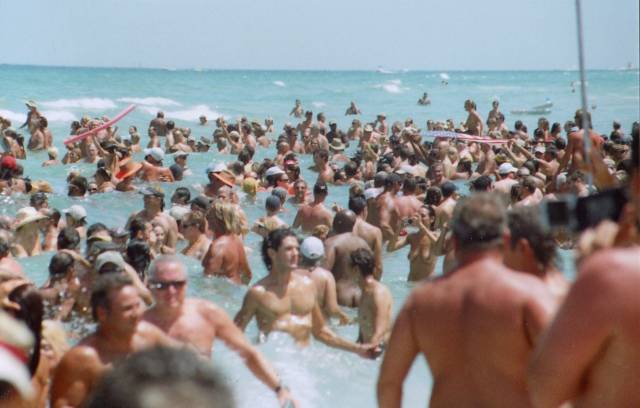
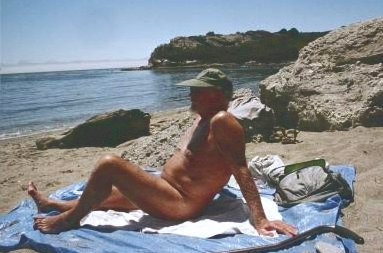
Most of the 100+ nude beaches and hot springs across America
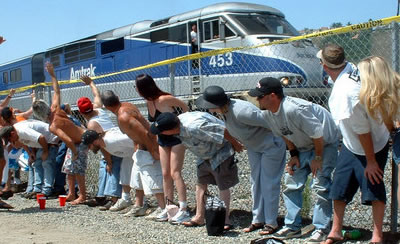
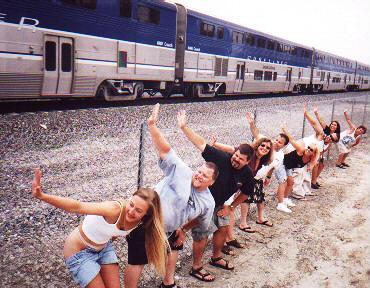
Mooning AMTRAK in Laguna Nigel every July...
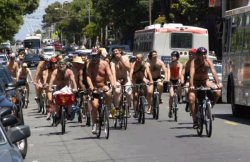
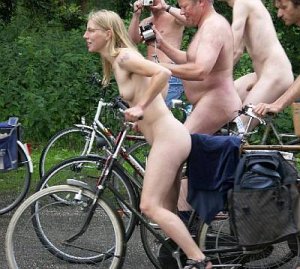
World Nude Bike Ride (held in over 200 cities around the world)
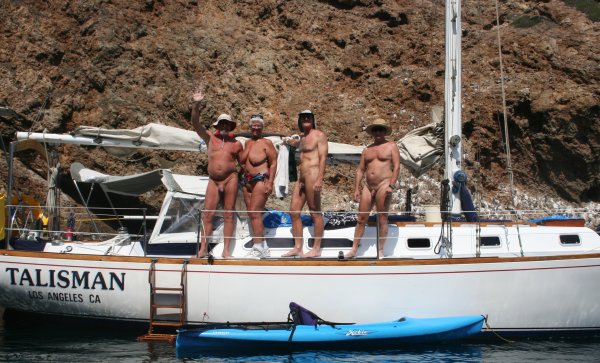

Nude sailing...driving naked on country roads (happens often!)


In some cities, being nude at home with the family or in your own
backyard is illegal
4. Nudity Is a "Civil Rights" Issue
This letter was posted on Nudistclubhouse.com 11/26/2011 by a member known as "Onza".
SCNA has no idea who this person is but we thought our members might be interested in his viewpoint on this "appropriate" debate. It is comforting to know there are others out there besides SCNA who "get it."